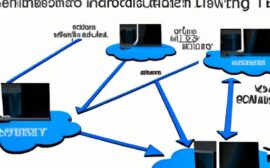In today’s fast-paced digital landscape, the concept of hybrid cloud management platforms has emerged as a game-changer for organizations looking to optimize their IT infrastructures. But what exactly are hybrid cloud management platforms? These innovative solutions provide a centralized platform for managing both on-premises and cloud-based resources seamlessly. By offering a unified interface to oversee a diverse range of IT environments, hybrid cloud management platforms empower businesses to achieve operational efficiency and agility like never before.
The importance of hybrid cloud management platforms in modern IT infrastructures cannot be overstated. With the increasing adoption of hybrid cloud environments, organizations face the challenge of efficiently managing complex infrastructures spanning multiple platforms. Hybrid cloud management platforms address this challenge by streamlining operations, enhancing security, and enabling seamless integration across different cloud environments. As businesses strive to stay competitive in a rapidly evolving digital landscape, the role of hybrid cloud management platforms in driving innovation and efficiency has become more critical than ever.
Benefits of Hybrid Cloud Management Platforms
Cost Savings
One of the key benefits of hybrid cloud management platforms is the potential for significant cost savings. By optimizing resource utilization and streamlining operations, organizations can reduce their overall IT expenses. With the ability to scale resources up or down based on demand, businesses can avoid overprovisioning and only pay for the resources they use. This cost-effective approach to IT management allows organizations to allocate their budget more efficiently and invest in other strategic initiatives.
Scalability and Flexibility
Hybrid cloud management platforms offer unparalleled scalability and flexibility, enabling organizations to adapt to changing business needs with ease. By leveraging a combination of on-premises and cloud resources, businesses can scale their infrastructure up or down quickly to accommodate fluctuations in workload. This flexibility allows organizations to respond to market demands more effectively and innovate at a faster pace. With hybrid cloud management platforms, businesses can future-proof their IT infrastructure and ensure they have the agility to thrive in a dynamic digital landscape.
Improved Security and Compliance
Security and compliance are top priorities for organizations operating in today’s digital environment. Hybrid cloud management platforms provide advanced security features and compliance capabilities to help businesses protect their data and meet regulatory requirements. By centralizing security policies and monitoring tools, organizations can ensure consistent security across their hybrid cloud environment. Additionally, hybrid cloud management platforms offer robust data encryption, access controls, and compliance reporting to help organizations mitigate security risks and maintain regulatory compliance.
Key Features of Hybrid Cloud Management Platforms
Unified Management Interface
One of the primary features that set hybrid cloud management platforms apart is their ability to provide a unified management interface. This centralized dashboard allows IT teams to oversee and manage both on-premises and cloud-based resources from a single location. By eliminating the need to switch between different management tools for each environment, organizations can streamline operations, reduce complexity, and enhance overall productivity.
Automation and Orchestration Capabilities
Hybrid cloud management platforms offer advanced automation and orchestration capabilities, allowing organizations to automate routine tasks and orchestrate complex workflows across hybrid environments. By automating repetitive processes, IT teams can free up valuable time and resources to focus on more strategic initiatives. Additionally, orchestration capabilities enable seamless integration and coordination of resources, applications, and services, resulting in improved efficiency and agility within the IT infrastructure.
Monitoring and Analytics Tools
Effective monitoring and analytics are essential components of hybrid cloud management platforms. These tools provide real-time visibility into the performance, availability, and security of hybrid environments, enabling IT teams to proactively identify and resolve issues before they impact operations. By leveraging advanced analytics capabilities, organizations can gain valuable insights into their IT infrastructure, optimize resource utilization, and make data-driven decisions to drive business growth and innovation.
Top Hybrid Cloud Management Platforms in the Market
Microsoft Azure Arc
Microsoft Azure Arc is a leading hybrid cloud management platform that enables organizations to extend Azure services to any infrastructure. With Azure Arc, businesses can manage resources across on-premises, multi-cloud, and edge environments through a unified control plane. This platform offers capabilities such as resource organization, governance, and security, providing a seamless experience for managing hybrid cloud environments.
VMware Cloud Foundation
VMware Cloud Foundation is another top hybrid cloud management platform that delivers a comprehensive software-defined infrastructure for hybrid cloud environments. By integrating compute, storage, networking, and management services, VMware Cloud Foundation simplifies the deployment and operation of hybrid cloud environments. With features like automated lifecycle management and workload mobility, VMware Cloud Foundation empowers organizations to accelerate their cloud transformation journey.
Google Anthos
Google Anthos is a modern hybrid cloud platform that enables organizations to build, deploy, and manage applications across multiple environments. Anthos offers a consistent development and operations experience across on-premises, Google Cloud, and other cloud providers. With capabilities like application modernization, automation, and security, Google Anthos provides a flexible and scalable solution for managing hybrid cloud environments.
IBM Cloud Pak for Multicloud Management
IBM Cloud Pak for Multicloud Management is a robust hybrid cloud management platform that helps organizations manage their multicloud environments more efficiently. By providing a single dashboard for monitoring and governing resources across different cloud platforms, IBM Cloud Pak for Multicloud Management simplifies operations and enhances visibility. With features like AI-powered insights and automation, this platform enables organizations to optimize their hybrid cloud infrastructure for better performance and cost efficiency.
Conclusion
As we conclude our exploration of hybrid cloud management platforms, it is evident that these innovative solutions play a crucial role in enhancing the efficiency and agility of modern IT infrastructures. By providing a unified platform for managing hybrid environments, organizations can streamline operations, improve security, and drive innovation across their IT landscapes.
In a digital age where adaptability and scalability are key to success, hybrid cloud management platforms offer a strategic advantage to businesses seeking to stay ahead of the curve. As technology continues to evolve at a rapid pace, the importance of leveraging hybrid cloud management platforms to optimize IT operations and drive business growth cannot be overstated. Embracing these best practices and harnessing the power of hybrid cloud management platforms will undoubtedly position organizations for success in the dynamic and competitive landscape of today’s digital world.



